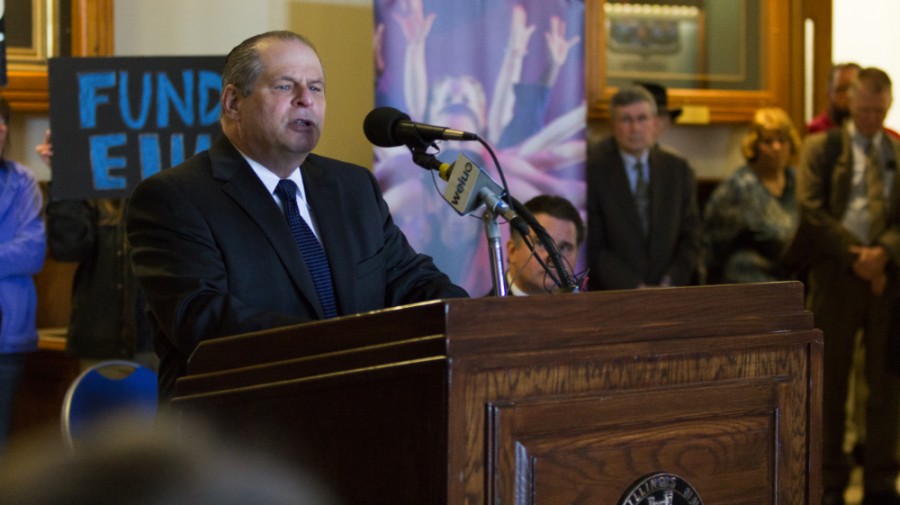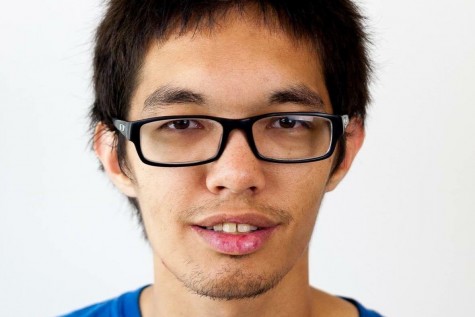Glassman speaks on Eastern’s difficulties in Senate hearing
Eastern President David Glassman speaks at a press conference on Feb. 23 in the Cougill Foyer of Old Main.
March 10, 2016
President David Glassman candidly shared the realities of Eastern’s struggle to stay afloat during a Senate hearing Thursday meant for public universities to relay their budget requests for fiscal year 2017.
Administrators from Southern Illinois University-Carbondale and Western Illinois University also projected their needs for the upcoming fiscal year while faced with no appropriations nine months into fiscal year 2016.
Glassman told the Senate that the 177 civil service employees being laid off Friday represent the devastatingly real effects the budget impasse is having on Eastern.
“Some are single parents; some are dealing with health issues, and in some cases, the layoffs will affect both husband and wife in the same household,” Glassman said.
He said Eastern already “right-sized” itself in the fall when up to $12 million was saved through the elimination of 198 Unit B faculty positions, the implementation of furlough days for administrative and professional employees, and other operational expense cuts.
“I wish to be clear that these positions are being eliminated not because they are unessential,” Glassman said. “We need them.”
Glassman said the state is “starving its universities to death” and asked the Senate what the endgame was supposed to be when, by the time state appropriations come through, a large number of students will have already left Illinois to pursue higher education elsewhere.
“Potential campus closures and layoffs appear to be considered as wins or losses in a political chess game,” he said. “We are encouraged to be vocal with our distress and at the same time warned to be quietly patient. Proposal after proposal is filed and lobbed across the aisle only to meet either quick defeat or eventual demise.”
Sen. Scott Bennett, D-Champaign, asked about Eastern’s reserves and the costs associated with Eastern footing the bill of its students’ MAP grants.
Glassman said Eastern started the year with $27 million in reserves but is now down to about $12 million, and the university is paying about $7.6 million for the MAP grants of 2,300 students.
Bennett also asked for a projection of Eastern’s future budget operations and whether or not the university would consider raising tuition to make up for lost funds.
Glassman said Eastern could save about $500,000 if statewide procurement reforms are implemented, but it would still be down about $7.5 million in fiscal year 2017 with Gov. Bruce Rauner’s proposed 20-percent cut from fiscal year 2015.
However, he said any tuition increase would be nominal and not used to compensate for such a large deficit.
“We have a strong commitment as we always have to be highly accessible, highly affordable for our students, and that will be continued,” Glassman said.
He said the university would instead look to continuing personnel efficiencies, increasing revenue streams and using integrative strategies to grow enrollment.
“These are positions that are critical to our operations, so if we were to take a 20-percent cut, we would have to be eliminating what I would say is beyond anything that would be soft cuts,” Glassman said. “These are very critical individuals.”
Sen. Dale Righter, R-Mattoon, said he and his colleagues believe Glassman has handled the difficulties of the budget situation in an “upright and competent manner” since he first took over the presidency in June.
“I’m sure when you put on the captain’s hat for Eastern Illinois University, this was not the storm that you thought you were piloting your ship into,” Righter said.
Righter also said the Senate should recognize the seriousness of the situation at Eastern and other universities.
“There is a perception in this building that well, because no one has closed their doors yet, it’s really not that bad yet, which is a tragic misperception,” Righter said.
Glassman said there is no specific “critical date” for Eastern continuing on its tight budget, but the university would continue to do whatever is necessary to keep going.
“We feel that we’re a partner of the state, and we’re doing it better than anybody else for our constituency of students,” he said. “And we’re waiting again for the state to do their part and assist us in the education.”
In a later email, Glassman said the feedback on his testimony was positive, but the only thing that matters is that lawmakers enact a higher education appropriation immediately.
“I hope it creates the sense of urgency that will finally move our lawmakers to come together across the aisle and work to develop a reasonable higher education appropriation bill that will be passed by both chambers of the legislature and signed by the governor,” he said.
Stephanie Markham can be reached at 581-2812 or samarkham@eiu.edu

















![[Thumbnail Edition] Senior Foward Macy McGlone, getsw the ball and gets the point during the first half of the game aginst Western Illinois University,, Eastern Illinois University Lost to Western Illinois University Thursday March 6 20205, 78-75 EIU lost making it the end of their season](https://www.dailyeasternnews.com/wp-content/uploads/2025/03/WBB_OVC_03_O-1-e1743361637111-1200x614.jpg)





















































